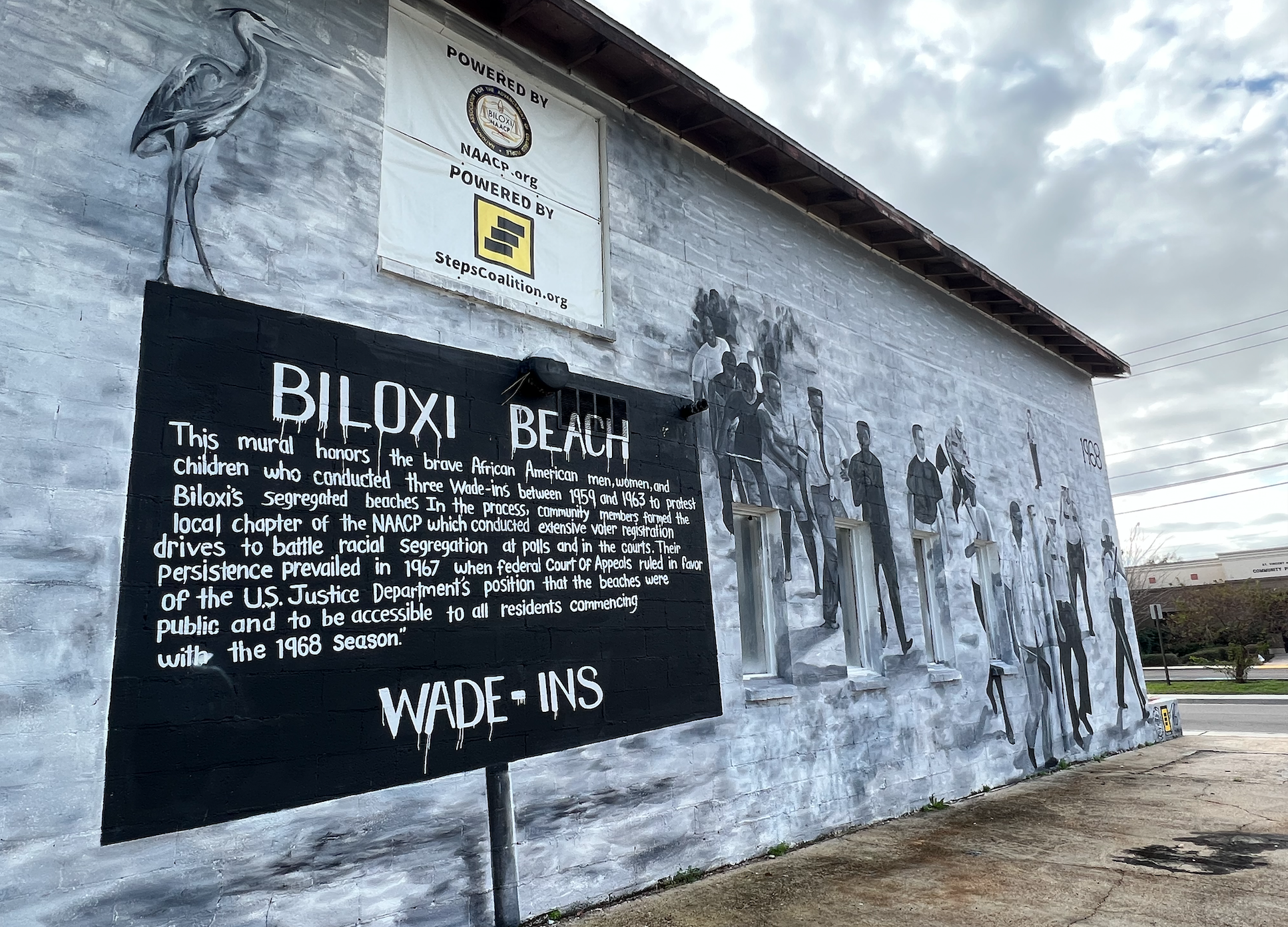Mississippi Today
This midterm party flip is not playing well for Republicans

This midterm party flip is not playing well for Republicans
BILOXI — Most voters would say that a politician switching parties in the middle of a term is the ultimate betrayal of their trust.
Elected officials are, indeed, entrusted by voters to make decisions for them based on a set of shared, usually partisan principles. District lines are drawn, laws are passed, and judicial opinions are written to honor this cornerstone of American democracy. It’s intended to ensure all people are adequately represented in our government — one of the most important ideals to everyday Americans who feel that trust is their only connection with the leaders who serve them.
That’s why a midterm flip-flop at any level feels like a blindside to those who live within those representatives’ districts. The feeling is especially fresh on the minds of many East Biloxi residents this week.
Biloxi City Councilman Felix Gines recently had one word for his recent flip from the Mississippi Democratic Party to the Mississippi Republican Party: relief. But many constituents in his ward are using much different words for his decision: disappointment, anger and, yes, betrayal.
Gines is the latest in a string of Democratic defections as state party dysfunction continues to cede power to Republicans. Mississippi Republicans wield immense political influence at the state, local and federal levels thanks, in large part, to flips.
But this latest conversion has turned more heads than usual because of its racial dynamics: Gines is the first GOP pick-up since state Republican Party leaders announced an initiative to attract Black candidates.

“Coming into a predominantly Black district and making a bold change like this will allow people to not take their vote for granted,” Gines told Mississippi Today in a lengthy interview last week. “So often, we’ll give our votes away for whatever reason. Well who’s going to be best for our community? That’s what it’s got to come down to. This bold move will serve as a wake-up call to not just the Black community, but all communities across the state. And particularly in Biloxi.”
He was right about at least one thing: His constituents here in Biloxi are wide awake following his party switch — just not in the way he was hoping.
About 20% of Biloxi’s 50,000 residents are Black. Gines was elected as a Democrat to the city council to represent East Biloxi, a predominantly Black neighborhood. For years, he has been the city’s only Black elected official — the beneficiary of the codified notion that all Americans should be adequately represented in government.
Civil rights history in Gines’ district runs deep. A series of wade-ins at Biloxi Beach in the 1960s helped integrate the Mississippi Gulf Coast and make it a vacation destination for Southern Blacks — a reality that continues to bolster the local economy. The main stretch of Highway 90 along the beach is named in honor of Dr. Gilbert R. Mason, who led the wade-ins and fought his whole life for voting rights and equal representation in government. Murals and other visible signs of the area’s commitment to political activism remain, and the Biloxi NAACP chapter is among the most active in the state.
Needless to say, Gines’ decision to pledge allegiance to the virtually all-white Mississippi Republican Party is not sitting well with many of his constituents.
“The Republican Party is the party that is everything anti-Black,” said Bill Stallworth, a community leader who formerly held Gines’ city council seat. “It’s the party of Strom Thurmond, of the Southern Strategy, of policies intended to keep Black folks down. To win, they’ve redrawn lines, disenfranchised so many voters and created lies about massive voter fraud. The effects are real, and they are deep.”
Putting Gines’ party switch bluntly, Stallworth said: “If we have to start throwing away our principles, if this is what we have to do to get elected, maybe we shouldn’t get elected.”
Gines told Mississippi Today no one factor led him to flip. When asked how he squared many of the modern Republican Party’s policies and principles that have worked against Black people, he harkened back to 19th century America.
“I’ve been using the term ‘going back home’ because this was once the party of Blacks,” Gines said. “Blacks once called the Republican Party the party of Lincoln. Look at the history: the Emancipation Proclamation, the 13th Amendment. When you start talking about civil rights and freedom, one of the first groups to push civil rights in America was the Republican Party. Now what it’s become versus what it was is two different things.”
When pressed about the more modern policies of the Republican Party, Gines deflected and said, “I don’t think that there’s anything that everyone believes in 100% in either party.” When asked which Republican Party platforms he agreed with, he mentioned just one theme.
“I grew up in a conservative household,” he said. “There were 11 kids, and we had to stretch a dollar. My dad knew how to budget his household. If he didn’t budget his household right, his kids would’ve had to go without. That is what we call true conservative living. Fiscal responsibility. That jumps right out.”
He did not directly answer a question about whether he felt he had properly managed the city of Biloxi’s spending during his previous two terms as a Democrat.
Just a few hours after he announced the party flip, there were broad talks of unseating Gines. For more than a week now, callers to WJZD owner Rip Daniels’ popular radio show “It’s a New Day” have blistered Gines for his party switch.
“Felix Gines’ values are just the same as all Republicans trying to move up — that is, they’re out for themselves,” Gwen Catchings, a retired professor and business owner who lives in Gines’ district, told Mississippi Today. “They’re willing to sell their soul to the devil in order to get where they want to go. What they fail to realize is that once you go down that slippery slope, you’ve lost all your integrity.”
The recent effort of GOP officials to attract Black elected officials may have flipped Gines, but it could prove difficult to sustain come election time. While generations of Black Mississippians have fought and even died for better representation, Mississippi has never elected a Black candidate to statewide office. No legislative Republican is Black, and virtually all of the state’s Black elected officials are Democrats or independents.
GOP officials, though, say they will double down on their currently held values to try to appeal to a more diverse set of candidates.
“We know our plans and policies to reduce inflation, lower taxes, cut wasteful spending, secure our borders, invest in national defense, and restore American energy are appealing to all Americans,” Mississippi GOP Chairman Frank Bordeaux said in a statement. “We’re taking that message to communities where Republicans have not traditionally been as successful in order to recruit, train, and elect a more diverse group of candidates and bring thousands more freedom-loving Mississippians into our party. Felix Gines making the decision to join our party is a major win for us.”
But Black voters in Gines’ district do not appear moved to join him in the Republican Party — “the party of Donald Trump and insurrectionists,” as Daniels recently put it on his radio show.
“I know Dr. Gilbert R. Mason is turning over in his grave today,” Catchings said of Gines’ GOP flip. “If the Republican Party really wants to do something for Black folks in Mississippi, it wouldn’t be important if Felix Gines or anyone else was Republican or Democrat. They would already be doing it. If they didn’t do it while he was a Democrat, they aren’t going to do it when he’s a Republican. It’s just so obvious. Why should we fall for that? What we have is just like Georgia and Herschel Walker. The white folks have found them a Black boy. That’s all this is, and we aren’t going to fall for it.”

In 2019, Gines ran as a Democrat for a Biloxi-based House of Representatives seat as a Democrat. He came within about 150 votes of unseating incumbent state Rep. Randall Patterson, a Republican who himself was a Democrat until he flipped to the Republican Party midterm in 2014. Gines decried the lack of support from the Mississippi Democratic Party in the 2019 race and blamed his loss on state party dysfunction.
When Mississippi Today asked if Gines planned to run for that House of Representatives seat in 2023, this time as a Republican, he let out an extended laugh before responding, “Right now, my job is to serve my constituents and do the best I can to serve them. But I won’t rule out any future runs.”
Patterson told Mississippi Today on Dec. 13 he had not yet decided whether he’ll run for a sixth term in the House, but he praised Gines for “having a good heart” and “doing a good job as Biloxi councilman.”
Regardless of Gines’ future plans, many of his council ward’s constituents are fuming. Stallworth, who served on the Biloxi City Council for 10 years and lost to Gines in the 2013 Democratic primary, said he was approached several times by the Republican Party with incentives to flip.
“All I had to do for more power was give up my integrity, to be loyal to the party, to be loyal to the money,” Stallworth said of those offers. “I didn’t do it because I’d rather be loyal to principles and to what my God says to be. I don’t plan on losing my soul. My integrity is the last thing I’ve got, and I’d fight with everything in my power to maintain that. I don’t have a lot to leave my children. But if I can leave them with a sense of integrity and honesty and fair play, if I can give them that, I will have done well.”
Stallworth continued: “I don’t mind anyone being a Democrat or Republican, but I do mind people being liars and cheats. I’d say that to Mr. Gines or any other politician. You’ve got to be honest with yourself at the end of the day. Anything less than that just isn’t acceptable.”
This article first appeared on Mississippi Today and is republished here under a Creative Commons license.
Mississippi Today
1964: Mississippi Freedom Democratic Party was formed
April 26, 1964

Civil rights activists started the Mississippi Freedom Democratic Party to challenge the state’s all-white regular delegation to the Democratic National Convention.
The regulars had already adopted this resolution: “We oppose, condemn and deplore the Civil Rights Act of 1964 … We believe in separation of the races in all phases of our society. It is our belief that the separation of the races is necessary for the peace and tranquility of all the people of Mississippi, and the continuing good relationship which has existed over the years.”
In reality, Black Mississippians had been victims of intimidation, harassment and violence for daring to try and vote as well as laws passed to disenfranchise them. As a result, by 1964, only 6% of Black Mississippians were permitted to vote. A year earlier, activists had run a mock election in which thousands of Black Mississippians showed they would vote if given an opportunity.
In August 1964, the Freedom Party decided to challenge the all-white delegation, saying they had been illegally elected in a segregated process and had no intention of supporting President Lyndon B. Johnson in the November election.
The prediction proved true, with white Mississippi Democrats overwhelmingly supporting Republican candidate Barry Goldwater, who opposed the Civil Rights Act. While the activists fell short of replacing the regulars, their courageous stand led to changes in both parties.
This article first appeared on Mississippi Today and is republished here under a Creative Commons Attribution-NoDerivatives 4.0 International License.![]()
Mississippi Today
Mississippi River flooding Vicksburg, expected to crest on Monday
Warren County Emergency Management Director John Elfer said Friday floodwaters from the Mississippi River, which have reached homes in and around Vicksburg, will likely persist until early May. Elfer estimated there areabout 15 to 20 roads underwater in the area.
“We’re about half a foot (on the river gauge) from a major flood,” he said. “But we don’t think it’s going to be like in 2011, so we can kind of manage this.”
The National Weather projects the river to crest at 49.5 feet on Monday, making it the highest peak at the Vicksburg gauge since 2020. Elfer said some residents in north Vicksburg — including at the Ford Subdivision as well as near Chickasaw Road and Hutson Street — are having to take boats to get home, adding that those who live on the unprotected side of the levee are generally prepared for flooding.



“There are a few (inundated homes), but we’ve mitigated a lot of them,” he said. “Some of the structures have been torn down or raised. There are a few people that still live on the wet side of the levee, but they kind of know what to expect. So we’re not too concerned with that.”
The river first reached flood stage in the city — 43 feet — on April 14. State officials closed Highway 465, which connects the Eagle Lake community just north of Vicksburg to Highway 61, last Friday.

Elfer said the areas impacted are mostly residential and he didn’t believe any businesses have been affected, emphasizing that downtown Vicksburg is still safe for visitors. He said Warren County has worked with the U.S. Army Corps of Engineers and the Mississippi Emergency Management Agency to secure pumps and barriers.
“Everybody thus far has been very cooperative,” he said. “We continue to tell people stay out of the flood areas, don’t drive around barricades and don’t drive around road close signs. Not only is it illegal, it’s dangerous.”
NWS projects the river to stay at flood stage in Vicksburg until May 6. The river reached its record crest of 57.1 feet in 2011.




This article first appeared on Mississippi Today and is republished here under a Creative Commons Attribution-NoDerivatives 4.0 International License.![]()
Mississippi Today
With domestic violence law, victims ‘will be a number with a purpose,’ mother says
Joslin Napier. Carlos Collins. Bailey Mae Reed.
They are among Mississippi domestic violence homicide victims whose family members carried their photos as the governor signed a bill that will establish a board to study such deaths and how to prevent them.
Tara Gandy, who lost her daughter Napier in Waynesboro in 2022, said it’s a moment she plans to tell her 5-year-old grandson about when he is old enough. Napier’s presence, in spirit, at the bill signing can be another way for her grandson to feel proud of his mother.
“(The board) will allow for my daughter and those who have already lost their lives to domestic violence … to no longer be just a number,” Gandy said. “They will be a number with a purpose.”
Family members at the April 15 private bill signing included Ashla Hudson, whose son Collins, died last year in Jackson. Grandparents Mary and Charles Reed and brother Colby Kernell attended the event in honor of Bailey Mae Reed, who died in Oxford in 2023.
Joining them were staff and board members from the Mississippi Coalition Against Domestic Violence, the statewide group that supports shelters and advocated for the passage of Senate Bill 2886 to form a Domestic Violence Facility Review Board.
The law will go into effect July 1, and the coalition hopes to partner with elected officials who will make recommendations for members to serve on the board. The coalition wants to see appointees who have frontline experience with domestic violence survivors, said Luis Montgomery, public policy specialist for the coalition.
A spokesperson from Gov. Tate Reeves’ office did not respond to a request for comment Friday.
Establishment of the board would make Mississippi the 45th state to review domestic violence fatalities.
Montgomery has worked on passing a review board bill since December 2023. After an unsuccessful effort in 2024, the coalition worked to build support and educate people about the need for such a board.
In the recent legislative session, there were House and Senate versions of the bill that unanimously passed their respective chambers. Authors of the bills are from both political parties.
The review board is tasked with reviewing a variety of documents to learn about the lead up and circumstances in which people died in domestic violence-related fatalities, near fatalities and suicides – records that can include police records, court documents, medical records and more.
From each review, trends will emerge and that information can be used for the board to make recommendations to lawmakers about how to prevent domestic violence deaths.
“This is coming at a really great time because we can really get proactive,” Montgomery said.
Without a board and data collection, advocates say it is difficult to know how many people have died or been injured in domestic-violence related incidents.
A Mississippi Today analysis found at least 300 people, including victims, abusers and collateral victims, died from domestic violence between 2020 and 2024. That analysis came from reviewing local news stories, the Gun Violence Archive, the National Gun Violence Memorial, law enforcement reports and court documents.
Some recent cases the board could review are the deaths of Collins, Napier and Reed.
In court records, prosecutors wrote that Napier, 24, faced increased violence after ending a relationship with Chance Fabian Jones. She took action, including purchasing a firearm and filing for a protective order against Jones.
Jones’s trial is set for May 12 in Wayne County. His indictment for capital murder came on the first anniversary of her death, according to court records.
Collins, 25, worked as a nurse and was from Yazoo City. His ex-boyfriend Marcus Johnson has been indicted for capital murder and shooting into Collins’ apartment. Family members say Collins had filed several restraining orders against Johnson.
Johnson was denied bond and remains in jail. His trial is scheduled for July 28 in Hinds County.
He was a Jackson police officer for eight months in 2013. Johnson was separated from the department pending disciplinary action leading up to immediate termination, but he resigned before he was fired, Jackson police confirmed to local media.
Reed, 21, was born and raised in Michigan and moved to Water Valley to live with her grandparents and help care for her cousin, according to her obituary.
Kylan Jacques Phillips was charged with first degree murder for beating Reed, according to court records. In February, the court ordered him to undergo a mental evaluation to determine if he is competent to stand trial, according to court documents.
At the bill signing, Gandy said it was bittersweet and an honor to meet the families of other domestic violence homicide victims.
“We were there knowing we are not alone, we can travel this road together and hopefully find ways to prevent and bring more awareness about domestic violence,” she said.
This article first appeared on Mississippi Today and is republished here under a Creative Commons Attribution-NoDerivatives 4.0 International License.
-

 News from the South - Florida News Feed6 days ago
News from the South - Florida News Feed6 days agoJim talks with Rep. Robert Andrade about his investigation into the Hope Florida Foundation
-

 News from the South - Alabama News Feed5 days ago
News from the South - Alabama News Feed5 days agoPrayer Vigil Held for Ronald Dumas Jr., Family Continues to Pray for His Return | April 21, 2025 | N
-

 Mississippi Today5 days ago
Mississippi Today5 days ago‘Trainwreck on the horizon’: The costly pains of Mississippi’s small water and sewer systems
-

 News from the South - Texas News Feed5 days ago
News from the South - Texas News Feed5 days agoMeteorologist Chita Craft is tracking a Severe Thunderstorm Warning that's in effect now
-

 News from the South - Florida News Feed4 days ago
News from the South - Florida News Feed4 days agoTrump touts manufacturing while undercutting state efforts to help factories
-

 News from the South - Virginia News Feed5 days ago
News from the South - Virginia News Feed5 days agoTaking video of military bases using drones could be outlawed | Virginia
-

 News from the South - Texas News Feed7 days ago
News from the South - Texas News Feed7 days agoNo. 3 Texas walks off No. 9 LSU again to capture crucial SEC softball series
-

 News from the South - Arkansas News Feed6 days ago
News from the South - Arkansas News Feed6 days agoAs country grows more polarized, America needs unity, the ‘Oklahoma Standard,’ Bill Clinton says














































